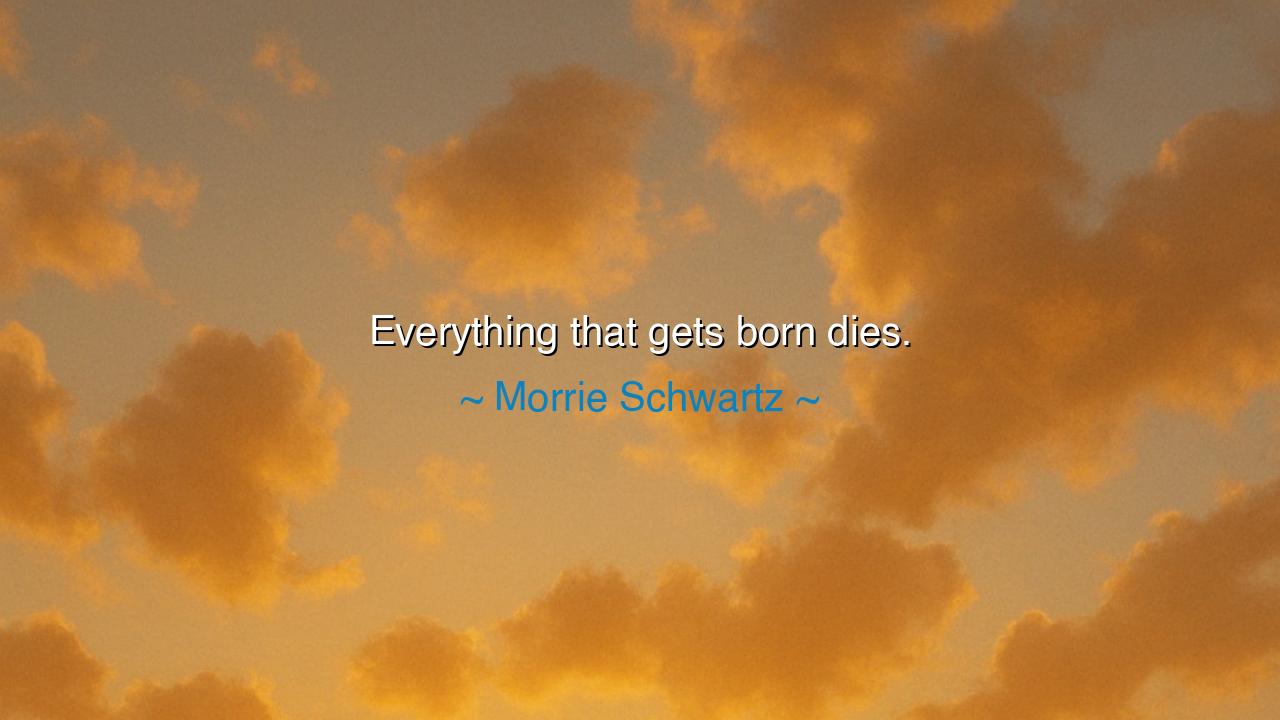
Everything that gets born dies.






When Morrie Schwartz spoke the words, “Everything that gets born dies,” he was not uttering despair, but truth—ancient, steady, and eternal. His voice, frail with age and illness, carried the quiet strength of one who had looked death in the eyes and found not terror, but understanding. Morrie, once a professor and always a philosopher of the heart, did not speak to frighten, but to awaken. For in acknowledging the inevitability of death, we are taught the secret of life—that its beauty is born not from permanence, but from passing. The leaf is precious because it falls. The day is radiant because it ends.
From the beginning of time, the wise have known this truth. The Buddha, sitting beneath the Bodhi tree, saw that all things are impermanent—that birth and death are two notes of the same sacred melody. To cling to what must change is to suffer; to accept its rhythm is to find peace. Morrie echoed that same eternal song, but in the language of our age—a voice of compassion guiding a world terrified of endings. His message was simple: do not flee from mortality, for it is the teacher of meaning. Only those who understand that everything dies learn how to truly live.
When we deny the truth of death, we become restless shadows chasing illusions. We hoard, we hurry, we pretend time bends to our will. But when we accept that all things are born only to pass away, a great calm enters the soul. We begin to savor rather than seize, to give rather than grasp. The awareness of impermanence transforms fear into reverence. Life, fleeting though it is, becomes sacred not because it lasts forever—but because it does not.
Consider the story of Morrie himself, whose final months were recorded in Tuesdays with Morrie. Afflicted with the cruel wasting of his body, he chose not to curse fate, but to teach from his deathbed. He spoke of love, forgiveness, and purpose, and reminded his former student that dying is not the end of living—it is simply the continuation of life in another form, the final lesson in the curriculum of existence. His body weakened, but his spirit grew vast, luminous. In the face of death, Morrie proved that mortality cannot diminish meaning; it defines it.
The ancients would have called such a man a sage, one who drinks from the bitter cup of truth and finds it sweet. For they, too, knew that the cycle of life and death is the heartbeat of the universe. The sun sets, and the stars arise. The seed decays, and from it springs the tree. Civilizations rise and fall, and yet humanity endures, learning, forgetting, and learning again. Death is not destruction—it is renewal. It is the shadow that gives shape to light, the silence that makes the music of life audible.
If we would live wisely, then we must live as Morrie did: with eyes open to the fleeting nature of all things. Do not cling to possessions—they are dust. Do not delay love—it is the only treasure time cannot take. Do not waste your days fearing the end, for the end is part of the story that makes every beginning beautiful. When you speak to those you love, speak as if it might be your last time—and in doing so, you will speak with truth, kindness, and depth.
So remember, children of the future: everything that gets born dies, but not all that dies is lost. What we love, what we give, what we awaken in others—these outlive our bodies. The body is a vessel, but the spirit is the current that flows onward. Let death be your reminder, not of endings, but of the urgency of life. Live fully, love deeply, and when your time comes, go not in fear but in gratitude, knowing you have played your part in the eternal dance of birth, death, and becoming.






AAdministratorAdministrator
Welcome, honored guests. Please leave a comment, we will respond soon